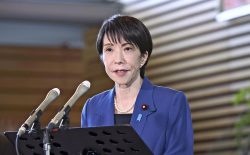
The Liberal Democratic Party headquarters in Chiyoda Ward, Tokyo
17:50 JST, April 22, 2022
A Liberal Democratic Party commission has proposed changing the phrase to describe Japan’s ability to destroy missile launch bases and other enemy facilities for self-defense from the current “capability to attack enemy bases” to “capability to conduct counterattacks,” The Yomiuri Shimbun has learned.
This change reflects concerns that the original expression could be interpreted as a “preemptive strike,” which could run counter to international law.
The targets of such counterstrikes would not be limited to missile bases, but would also include the other country’s “command and control functions,” such as a command center directing the attack.
The LDP’s Research Commission on Security, headed by former Defense Minister Itsunori Onodera, broadly agreed Thursday on proposals for the National Security Strategy and two other key documents the government plans to revise at the end of the year.
The commission’s proposal specified that Japan should, within the scope of exclusively defense-oriented policies, “possess the capability to conduct counterattacks against an armed attack on our nation, including a ballistic missile attack.”
The proposal also touched on the fact that member nations of the North Atlantic Treaty Organization (NATO) have the common target of spending at least 2% of gross domestic product on defense outlays. The commission stated that Japan should aim to achieve the “necessary” budget level for “fundamentally strengthening” the nation’s defense capability “within five years.”
The current security strategy, which was formulated in 2013, set out the importance of enhancing bilateral relations with Russia. However, in light of Russia’s invasion of Ukraine, the proposal changed position and described Moscow as “a realistic threat.”
Of the three documents, the proposal also called for the National Defense Program Guidelines to be renamed as the “national defense strategy,” and the Medium Term Defense Program as the “defense program.”
The LDP plans to soon formally approve the proposals and submit them to the government.
‘Straightforward’ expression
The proposal to change to the expression “capability to conduct counterattacks” reflected a judgment that it was necessary to clearly differentiate between such a capability and a preemptive strike that would run counter to international law.
“Japan does not wish to preemptively attack another nation,” Onodera said after the commission’s meeting Thursday. “Using the word ‘counterattack’ was the most straightforward way we could express this.”
Komeito, the LDP’s coalition partner, has been strongly pressing for the phrase to be changed, mainly due to concern that “capability to attack enemy bases” could be misunderstood as a capability for a preemptive strike. The commission considered various alternatives, such as “capability to conduct counterattacks for self-defense,” “defense in areas outside Japanese territory,” and “capability to launch counterattacks against missiles.” However, commission members failed to unanimously agree on any of these options for reasons including the difficulty of settling on a suitable English equivalent.
In a proposal compiled in 2017, the LDP used the wording “capability to launch counterstrikes against enemy bases.” But in recent years, North Korea has repeatedly fired ballistic missiles from transporter erector launcher vehicles and even from submarines. Therefore, the target of any counterattack might not be restricted to a base. So the commission settled on the most concise expression that covered these options.
Some LDP members, alarmed by Russia’s invasion of Ukraine, supported stipulating that Japan should aim to spend at least 2% of GDP on defense, as NATO members do. Germany also has unveiled a plan to swiftly increase defense spending to more than 2% of GDP.
During the draft stage, the proposal suggested that Japan “aim to achieve a similar budget level within five years,” which would establish the concept of the nation spending 2% of its GDP on defense within that period. However, this idea received some pushback, with one former defense minister stating that Japan “should spend at a level within its means.”
Ultimately, the proposal opted for the vague expression of achieving the “necessary” budget level “within five years.”
Defense spending in this fiscal year’s budget accounted for about 1% of GDP. Raising the figure to 2% would inflate Japan’s defense budget to more than ¥10 trillion.
Top Articles in Politics
-

LDP Wins Historic Landslide Victory
-

LDP Wins Landslide Victory, Secures Single-party Majority; Ruling Coalition with JIP Poised to Secure Over 300 seats (UPDATE 1)
-

CRA Leadership Election Will Center on Party Rebuilding; Lower House Defeat Leaves Divisions among Former CDPJ, Komeito Members
-

Japan Tourism Agency Calls for Strengthening Measures Against Overtourism
-

Japan PM Takaichi’s Cabinet Resigns en Masse
JN ACCESS RANKING
-

Japan Institute to Use Domestic Commercial Optical Lattice Clock to Set Japan Standard Time
-

Israeli Ambassador to Japan Speaks about Japan’s Role in the Reconstruction of Gaza
-

Man Infected with Measles May Have Come in Contact with Many People in Tokyo, Went to Store, Restaurant Around When Symptoms Emerged
-

Prudential Life Insurance Plans to Fully Compensate for Damages Caused by Fraudulent Actions Without Waiting for Third-Party Committee Review
-

Woman with Measles Visited Hospital in Tokyo Multiple Times Before Being Diagnosed with Disease























